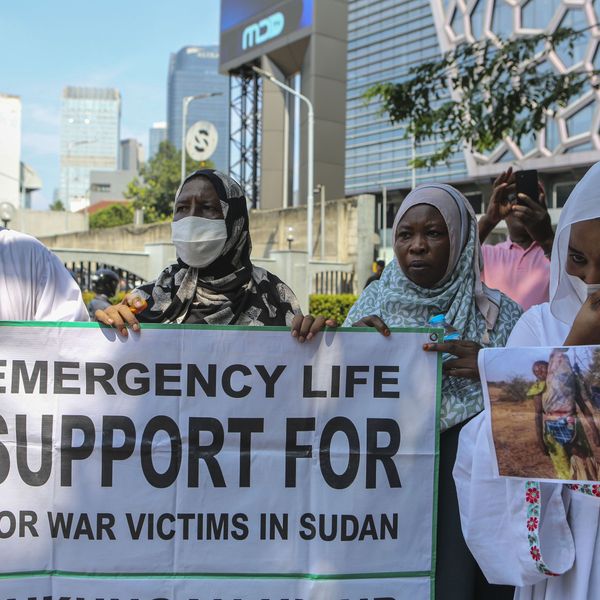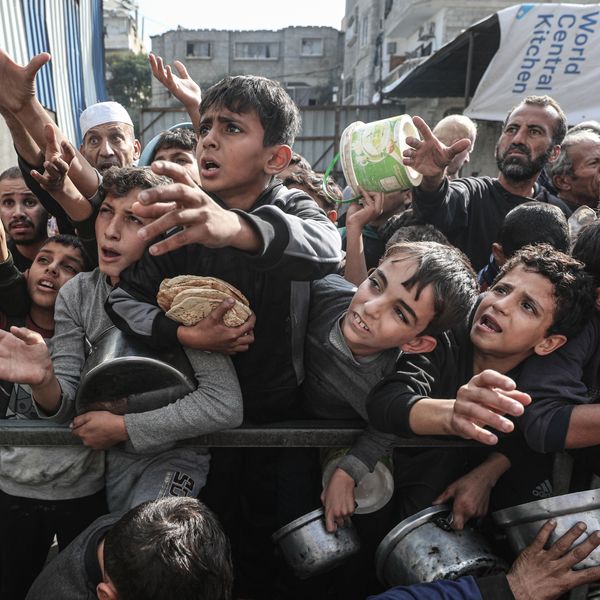
Soacha's Mayor Juan Carlos Saldarriaga, delivers food to the community during the mandatory quarantine to prevent the spread of the new coronavirus in Soacha, Colombia on April 15, 2020. Colombia extended its national lock down until April 26 to control spread of COVID-19. (Photo: Leonardo Munoz/VIEWpress via Getty Images)
Warning of 'Hammer Blow' From Pandemic, UN Food Agencies Say Coronavirus Could Double Global Levels of Acute Hunger
A new report states 265 million people could face food insecurity by the end of 2020, up from 130 million last year.
Top food security experts at the United Nations on Tuesday will present to the U.N. Security Council a new report on how the global coronavirus pandemic could double the number of people around the world suffering from acute hunger unless wealthy countries step up humanitarian aid immediately.
The World Food Program (WFP), the U.N. Food and Agriculture Organization (FAO), and a dozen other groups are imploring global policymakers to send $350 million in food aid to the most vulnerable countries on the planet, particularly in the Middle East and Africa, to keep people from starving as the pandemic shuts down economies and makes it more difficult to access food.
"Our utmost responsibility is to protect those who need us the most," tweeted the WFP ahead of the meeting.
\u201cWhat will #COVID19 mean for the world's most vulnerable people?\n\nAs challenges to food security multiply and cross borders, our utmost responsibility is to protect those who need us the most. #GlobalFoodCrises #FightFoodCrises\u201d— World Food Programme (@World Food Programme) 1587474120
According to the "Global Report on Food Crises," (pdf) published Tuesday, 265 million people are expected to face food insecurity and hunger by the end of 2020--more than doubling the number from the previous year, when 130 million people worldwide were already chronically hungry.
"It's critical that commercial trade continues to flow. Hoarding food supplies or putting up trade barriers does not work. Starving your neighbor is not good policy."
--Arif Husain, WFP
The new coronavirus, which causes the disease COVID-19, was added to the report's list of key drivers of hunger, along with violent conflicts, weather extremes, economic shocks, and desert locusts--which were already threatening crops in East Africa before the pandemic began spreading across the globe in January, putting at risk enough food to feed 35,000 people per day.
Arif Husain, chief economist for WFP, told reporters Tuesday that people in regions that were already experiencing such shocks, as well as displaced people living in refugee camps in countries like South Sudan, Nigeria, Yemen, and Syria, are among those most at risk for starvation.
"These are the people I'm most worried about," said Husain. "They did not need COVID-19. Even without it their lives were hanging by a thread. They literally depend on us for their lives. If we cannot get to them for any reason they end up paying the ultimate price. We need to prioritize the people and make sure we're there. Because if it's not us, it's no one else."
To protect vulnerable populations, the WFP is expected to tell the Security Council, governments must avoid export bans and should begin releasing hundreds of millions of dollars in aid, only a quarter of which has been made available so far.
In recent weeks, countries including Russia, Ukraine, and Kazakhstan have suspended exports on certain crops, raising concerns over high food prices in the developing world--and evoking memories of unrest in 2007 and 2008 during the global economic meltdown.
"It's critical that commercial trade continues to flow," Husain said. "Hoarding food supplies or putting up trade barriers does not work. Starving your neighbor is not good policy. We have seen this many times in the food and fuel crisis in 2008 and the financial crisis of 2009."
In addition to limits on exports, people in developing countries face restricted movement which will make harvesting and distributing crops difficult if not impossible and labor shortages as people become ill, which could threaten food production.
The effects of the pandemic, Husain said, amount to a "hammer blow" for millions of people "who can only eat if they earn a wage."
"We all need to come together to deal with this because if we don't the cost will be too high--the global cost will be too high: many lost lives and many, many more lost livelihoods," Husain told the press.
An Urgent Message From Our Co-Founder
Dear Common Dreams reader, The U.S. is on a fast track to authoritarianism like nothing I've ever seen. Meanwhile, corporate news outlets are utterly capitulating to Trump, twisting their coverage to avoid drawing his ire while lining up to stuff cash in his pockets. That's why I believe that Common Dreams is doing the best and most consequential reporting that we've ever done. Our small but mighty team is a progressive reporting powerhouse, covering the news every day that the corporate media never will. Our mission has always been simple: To inform. To inspire. And to ignite change for the common good. Now here's the key piece that I want all our readers to understand: None of this would be possible without your financial support. That's not just some fundraising cliche. It's the absolute and literal truth. We don't accept corporate advertising and never will. We don't have a paywall because we don't think people should be blocked from critical news based on their ability to pay. Everything we do is funded by the donations of readers like you. Will you donate now to help power the nonprofit, independent reporting of Common Dreams? Thank you for being a vital member of our community. Together, we can keep independent journalism alive when it’s needed most. - Craig Brown, Co-founder |
Top food security experts at the United Nations on Tuesday will present to the U.N. Security Council a new report on how the global coronavirus pandemic could double the number of people around the world suffering from acute hunger unless wealthy countries step up humanitarian aid immediately.
The World Food Program (WFP), the U.N. Food and Agriculture Organization (FAO), and a dozen other groups are imploring global policymakers to send $350 million in food aid to the most vulnerable countries on the planet, particularly in the Middle East and Africa, to keep people from starving as the pandemic shuts down economies and makes it more difficult to access food.
"Our utmost responsibility is to protect those who need us the most," tweeted the WFP ahead of the meeting.
\u201cWhat will #COVID19 mean for the world's most vulnerable people?\n\nAs challenges to food security multiply and cross borders, our utmost responsibility is to protect those who need us the most. #GlobalFoodCrises #FightFoodCrises\u201d— World Food Programme (@World Food Programme) 1587474120
According to the "Global Report on Food Crises," (pdf) published Tuesday, 265 million people are expected to face food insecurity and hunger by the end of 2020--more than doubling the number from the previous year, when 130 million people worldwide were already chronically hungry.
"It's critical that commercial trade continues to flow. Hoarding food supplies or putting up trade barriers does not work. Starving your neighbor is not good policy."
--Arif Husain, WFP
The new coronavirus, which causes the disease COVID-19, was added to the report's list of key drivers of hunger, along with violent conflicts, weather extremes, economic shocks, and desert locusts--which were already threatening crops in East Africa before the pandemic began spreading across the globe in January, putting at risk enough food to feed 35,000 people per day.
Arif Husain, chief economist for WFP, told reporters Tuesday that people in regions that were already experiencing such shocks, as well as displaced people living in refugee camps in countries like South Sudan, Nigeria, Yemen, and Syria, are among those most at risk for starvation.
"These are the people I'm most worried about," said Husain. "They did not need COVID-19. Even without it their lives were hanging by a thread. They literally depend on us for their lives. If we cannot get to them for any reason they end up paying the ultimate price. We need to prioritize the people and make sure we're there. Because if it's not us, it's no one else."
To protect vulnerable populations, the WFP is expected to tell the Security Council, governments must avoid export bans and should begin releasing hundreds of millions of dollars in aid, only a quarter of which has been made available so far.
In recent weeks, countries including Russia, Ukraine, and Kazakhstan have suspended exports on certain crops, raising concerns over high food prices in the developing world--and evoking memories of unrest in 2007 and 2008 during the global economic meltdown.
"It's critical that commercial trade continues to flow," Husain said. "Hoarding food supplies or putting up trade barriers does not work. Starving your neighbor is not good policy. We have seen this many times in the food and fuel crisis in 2008 and the financial crisis of 2009."
In addition to limits on exports, people in developing countries face restricted movement which will make harvesting and distributing crops difficult if not impossible and labor shortages as people become ill, which could threaten food production.
The effects of the pandemic, Husain said, amount to a "hammer blow" for millions of people "who can only eat if they earn a wage."
"We all need to come together to deal with this because if we don't the cost will be too high--the global cost will be too high: many lost lives and many, many more lost livelihoods," Husain told the press.
Top food security experts at the United Nations on Tuesday will present to the U.N. Security Council a new report on how the global coronavirus pandemic could double the number of people around the world suffering from acute hunger unless wealthy countries step up humanitarian aid immediately.
The World Food Program (WFP), the U.N. Food and Agriculture Organization (FAO), and a dozen other groups are imploring global policymakers to send $350 million in food aid to the most vulnerable countries on the planet, particularly in the Middle East and Africa, to keep people from starving as the pandemic shuts down economies and makes it more difficult to access food.
"Our utmost responsibility is to protect those who need us the most," tweeted the WFP ahead of the meeting.
\u201cWhat will #COVID19 mean for the world's most vulnerable people?\n\nAs challenges to food security multiply and cross borders, our utmost responsibility is to protect those who need us the most. #GlobalFoodCrises #FightFoodCrises\u201d— World Food Programme (@World Food Programme) 1587474120
According to the "Global Report on Food Crises," (pdf) published Tuesday, 265 million people are expected to face food insecurity and hunger by the end of 2020--more than doubling the number from the previous year, when 130 million people worldwide were already chronically hungry.
"It's critical that commercial trade continues to flow. Hoarding food supplies or putting up trade barriers does not work. Starving your neighbor is not good policy."
--Arif Husain, WFP
The new coronavirus, which causes the disease COVID-19, was added to the report's list of key drivers of hunger, along with violent conflicts, weather extremes, economic shocks, and desert locusts--which were already threatening crops in East Africa before the pandemic began spreading across the globe in January, putting at risk enough food to feed 35,000 people per day.
Arif Husain, chief economist for WFP, told reporters Tuesday that people in regions that were already experiencing such shocks, as well as displaced people living in refugee camps in countries like South Sudan, Nigeria, Yemen, and Syria, are among those most at risk for starvation.
"These are the people I'm most worried about," said Husain. "They did not need COVID-19. Even without it their lives were hanging by a thread. They literally depend on us for their lives. If we cannot get to them for any reason they end up paying the ultimate price. We need to prioritize the people and make sure we're there. Because if it's not us, it's no one else."
To protect vulnerable populations, the WFP is expected to tell the Security Council, governments must avoid export bans and should begin releasing hundreds of millions of dollars in aid, only a quarter of which has been made available so far.
In recent weeks, countries including Russia, Ukraine, and Kazakhstan have suspended exports on certain crops, raising concerns over high food prices in the developing world--and evoking memories of unrest in 2007 and 2008 during the global economic meltdown.
"It's critical that commercial trade continues to flow," Husain said. "Hoarding food supplies or putting up trade barriers does not work. Starving your neighbor is not good policy. We have seen this many times in the food and fuel crisis in 2008 and the financial crisis of 2009."
In addition to limits on exports, people in developing countries face restricted movement which will make harvesting and distributing crops difficult if not impossible and labor shortages as people become ill, which could threaten food production.
The effects of the pandemic, Husain said, amount to a "hammer blow" for millions of people "who can only eat if they earn a wage."
"We all need to come together to deal with this because if we don't the cost will be too high--the global cost will be too high: many lost lives and many, many more lost livelihoods," Husain told the press.

